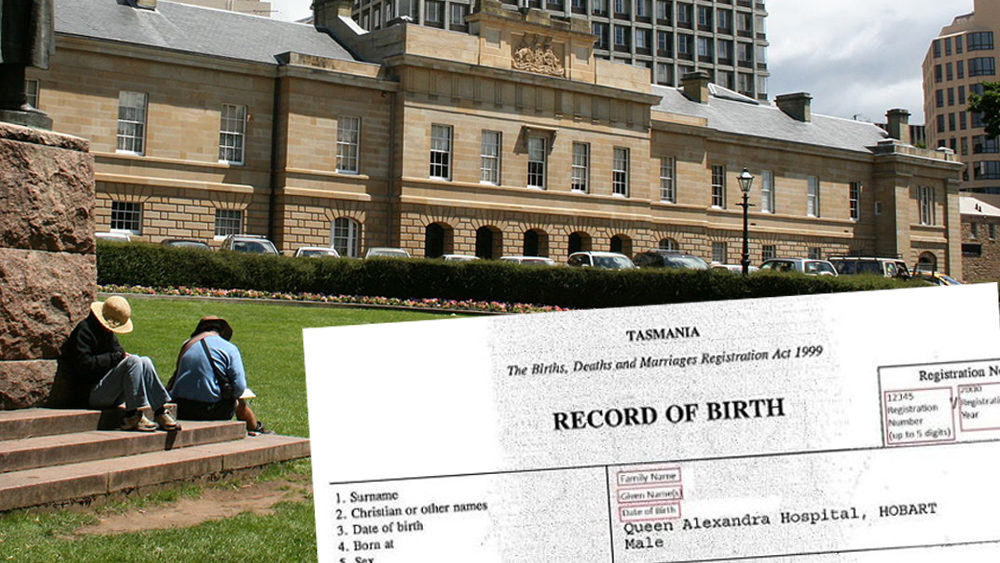What the Tasmanian birth certificates bill really says
Groundbreaking legislation moves through Lower House
Tasmania is poised to be the first Australian state to make it optional for a child’s gender to be included on their birth certificate.
On Tuesday night, Tasmania’s Lower House voted to pass additional amendments to the Births, Deaths and Marriages Act, which also included amendments to what is required when registering for a change of sex.
“The changes will have no effect on the vast majority of people …” – Labor MP Ella Haddad
Liberal Speaker Sue Hickey crossed the floor to vote with Greens and Labor members. None of Hickey’s Liberal colleagues supported the additions to amendments initially introduced by Attorney-General Elise Archer.
While the ACT already has “M”, “F” or “X” available as birth certificate options, the proposed Tasmanian amendments go further to allow parents to not record gender on the legal document.
“This amendment removes reference to sex or gender of the person from the issue certificate and allows the person to ask for their gender to be included on the birth certificate,” Shadow Attorney General Ella Haddad told the Tasmanian Lower House, referring to a new Clause 13A.
“It creates, in effect, an opt-in approach to including reference to gender on a person’s birth certificate. ”
This particular amendment (the new Clause 13A presented by Haddad) has attracted the most attention. It prompted Attorney-General Archer to ask Haddad in Parliament: “Correct me if I am wrong, because we have not had a chance to properly examine all of this, [but what it appears to do] is mean that all people will not have sex or gender on any certificate unless they, or if under 16, their parents, approve it.”
“Apparently this extends to all certificates issued under this act, including death certificates, so it is wider reaching than just birth certificates.”
This new Clause 13A proposed Section 46 of the Principal Act (Births, Deaths and Marriages Act) be amended as follows:
After Section 46(1) insert –
(1A) Information about sex or gender may only be included on any certificate if requested by:
(a) a person 16 years or over to whom the certificate relates; or
(b) if the person is under 16 years, by a person referred to in section 28A(2) or section 28A(3) of this Act.
(1B) The gender included is to be:
(a) the gender as determined under section 28A or section 28C of this Act; or
(b) if requested, the sex or gender previously listed on the Register or collected under section 50.
(The references to section 28 are about parents and/or guardians supplying information. Section 50 allows the registrar to collect information, outside of formal registrations of births. This was the subject of another amendment – see below)
Haddad said Archer and the Liberal Party previously had made “false claims” that such amendments to Section 46 were “making radical changes and removing gender and removing the option for gender to be printed on certificates.”
“I hesitate to the use words ‘opt in’ because it will actually be a very simply implemented change which would allow the question to be asked on application for a birth certificate, ‘Do you wish to have gender printed onto this birth certificate?’.
Supported by gender rights lobby group Transforming Tasmania, the passing of the amendments was seen as a flow-on effect of last year’s marriage debate, according to Haddad.
“The amendments protect the rights of people who need it and will in no way diminish the rights of others.” Haddad said.
“The changes will have no effect on the vast majority of people, but will have an enormously positive effect on the people who deserve to enjoy these rights just like the rest of us.”
Greens leader Cassy O’Connor told Parliament: “The inclusion of gender on birth certificates has one effect, and that is to perpetuate discrimination against people who are transgender or gender diverse. To not remove it is to continue that harm.”
Birth certificate “integrity must not be compromise” – Attorney-General Elise Archer
But before the vote on Tuesday, Attorney-General Archer urged that “birth certificates are used to get passports, vehicle and gun licenses – their integrity must not be compromised.”
“Any change would require wide-ranging consultation, not least of all to ensure they can be validated through the Commonwealth Document Verification Service.”
As reported by ABC, other amendments which passed on Tuesday night included “the parents of a child aged under 16 years whose birth is registered in the State may apply to the Registrar, in a form approved by the Registrar, for inclusion of gender information under Section 50 of this Act.”
Another key decision reported by the ABC is that the sex of the child would still be recorded on medical records.
To become law, the amendments need to pass Tasmania’s Upper House.




